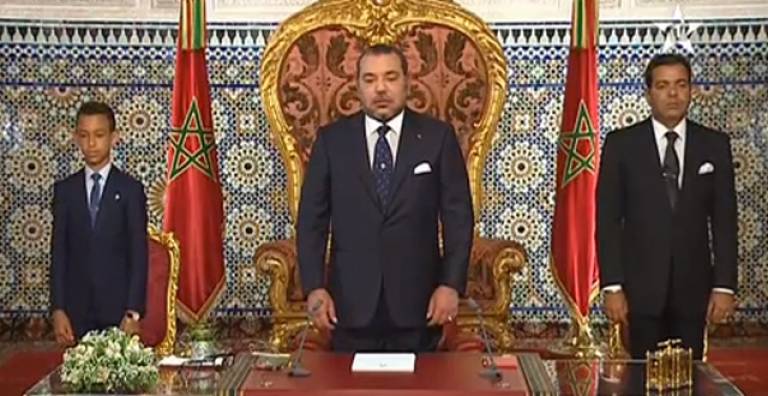HM King Mohammed VI stressed human dignity and called on social disparity that continues to pull the country down despite the efforts. He also dedicated a good portion to the Moroccan citizens abroad, during his speech to the nation. The Sovereign talked at length about the issue of insecurity that still hampers many remote parts of the Kingdom and the particular role of the Council of the Moroccan Community Abroad (CCME) to better assist Moroccans living abroad.
During his speech, His Majesty the King was keen to put on a par the worries experienced by Moroccan citizens and their counterparts living abroad. This is a true testament to the important role of our Moroccan citizens abroad: "Our desire to protect the interests of our children living abroad, to strengthen their identity and ties to enable them to provide assistance to the development of their homeland. "
The testimony of the sovereign is even more poignant as he recounts his own experiences with the community members: "During my visits abroad and when meeting here with members of our community living abroad, I was able to have a clear idea about their true concerns and legitimate ambitions.
I used to think that they only had difficulties while in Morocco. As it turned out, many of them also complained about the way they were treated on the premises of Moroccan consulates.
Their requests may not be met, but at least they should be received and treated with respect and courtesy.
A testimony that resulted in a call to the institutions responsible for the welfare of our citizens abroad: "We draw the attention of the Minister of Foreign Affairs on the need to work with all the firmness required to end malfunctions and other problems in some consulates. " He further added that he had "on one hand, to remove from office anyone who has been convicted of neglect, disdain for the interests of community members, or abuse towards them.
Secondly, make sure to choose the consuls among those who meet the requirements of competence, responsibility and dedication to serve our children abroad ".
The Sovereign has said that "the members of our community are even more disappointed when they make comparisons between, on the one hand, the level of benefits provided by administrative and social services of the countries of residence, and the welcome reserved for them, and, secondly, the treatment they are subjected to within these national consular missions. If they fail to settle their affairs, at least they should be welcomed and treated with courtesy and respect.
Among other issues, they suffer from slow procedures when they have a birth to register or an administrative error to correct, which costs them time and money.
Names for newborns are also an issue that the Higher Civil Status Committee should work on to find reasonable solutions for the cases under consideration, showing flexibility and understanding. There should be no pressure exerted and no name imposed on anybody.
The same goes for the slow, complicated procedures to renew and validate official documents.
In any event, communication and interaction should be improved and services made more readily available to citizens, while procedures should be simplified and upgraded, and human rights and dignity preserved.
As for the problems the members of this community endure when they return home, I insist that anyone who tampers with their interests or takes advantage of their situation should be firmly sanctioned.
Despite all the difficulties they face, it is gratifying to see that the number of Moroccans visiting their home country every year is on the rise. Their love for their country is a source of pride for me and I have told them how keen I am to protect their interests.
Furthermore, in order to increase their participation in national politics, I call for the implementation of the constitutional provisions relating to their representation in consultative institutions and participative democracy and governance bodies.
Once again, I stress the need to develop an integrated strategy based on interaction and coordination between national institutions in charge of immigration issues, to enhance their efficiency and allow them to better serve the Moroccan community abroad. In this regard, the expertise of the Council for the Moroccan Community Abroad should be built on in order to establish a council that responds to the aspirations of this community. " .

